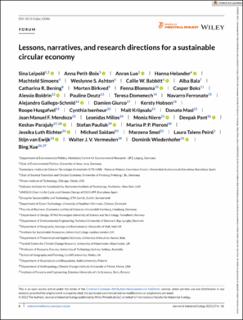| dc.contributor.author | Leipold, Sina | |
| dc.contributor.author | Petit-Boix, Anna | |
| dc.contributor.author | Luo, Anran | |
| dc.contributor.author | Helander, Hanna | |
| dc.contributor.author | Simoens, Machteld | |
| dc.contributor.author | Ashton, Weslynne | |
| dc.contributor.author | Babbitt, Callie | |
| dc.contributor.author | Bala, Alba | |
| dc.contributor.author | Bening, Catharina | |
| dc.contributor.author | Birkved, Morten | |
| dc.contributor.author | Blomsma, Fenna | |
| dc.contributor.author | Boks, Casper | |
| dc.contributor.author | Boldrin, Alessio | |
| dc.contributor.author | Deutz, Pauline | |
| dc.contributor.author | Domenech, Teresa | |
| dc.contributor.author | Ferronato, Navarro | |
| dc.contributor.author | Gallego-Schmid, Alejandro | |
| dc.contributor.author | Giurco, Damien | |
| dc.contributor.author | Hobson, Kersty | |
| dc.contributor.author | Husgafvel, Roope | |
| dc.contributor.author | Isenhour, Cynthia | |
| dc.contributor.author | Kriipsalu, Mait | |
| dc.contributor.author | Masi, Donato | |
| dc.contributor.author | Mendoza, Joan Manuel F | |
| dc.contributor.author | Milios, Leonidas | |
| dc.contributor.author | Niero, Monia | |
| dc.contributor.author | Pant, Deepak | |
| dc.contributor.author | Parajuly, Keshav | |
| dc.contributor.author | Pauliuk, Stefan | |
| dc.contributor.author | Pieroni, Marina | |
| dc.contributor.author | Richter, Jessika Luth | |
| dc.contributor.author | Saidani, Michael | |
| dc.contributor.author | Smol, Marzena | |
| dc.contributor.author | Peiró, Laura Talens | |
| dc.contributor.author | van Ewijk, Stijn | |
| dc.contributor.author | Vermeulen, Walter J. V. | |
| dc.contributor.author | Wiedenhofer, Dominik | |
| dc.contributor.author | Xue, Bing | |
| dc.date.accessioned | 2023-03-10T09:27:01Z | |
| dc.date.available | 2023-03-10T09:27:01Z | |
| dc.date.created | 2022-12-30T12:10:53Z | |
| dc.date.issued | 2023 | |
| dc.identifier.citation | Journal of Industrial Ecology. 2023, 27 (1), 6-18. | en_US |
| dc.identifier.issn | 1088-1980 | |
| dc.identifier.uri | https://hdl.handle.net/11250/3057592 | |
| dc.description.abstract | The current enthusiasm for the circular economy (CE) offers a unique opportunity to advance the impact of research on sustainability transitions. Diverse interpretations of CE by scholars, however, produce partly opposing assessments of its potential benefits, which can hinder progress. Here, we synthesize policy-relevant lessons and research directions for a sustainable CE and identify three narratives—optimist, reformist, and skeptical—that underpin the ambiguity in CE assessments. Based on 54 key CE scholars’ insights, we identify three research needs: the articulation and discussion of ontologically distinct CE narratives; bridging of technical, managerial, socio-economic, environmental, and political CE perspectives; and critical assessment of opportunities and limits of CE science–policy interactions. Our findings offer practical guidance for scholars to engage reflexively with the rapid expansion of CE knowledge, identify and pursue high-impact research directions, and communicate more effectively with practitioners and policymakers. | en_US |
| dc.language.iso | eng | en_US |
| dc.publisher | Wiley | en_US |
| dc.rights | Navngivelse 4.0 Internasjonal | * |
| dc.rights.uri | http://creativecommons.org/licenses/by/4.0/deed.no | * |
| dc.title | Lessons, narratives, and research directions for a sustainable circular economy | en_US |
| dc.title.alternative | Lessons, narratives, and research directions for a sustainable circular economy | en_US |
| dc.type | Peer reviewed | en_US |
| dc.type | Journal article | en_US |
| dc.description.version | publishedVersion | en_US |
| dc.source.pagenumber | 6-18 | en_US |
| dc.source.volume | 27 | en_US |
| dc.source.journal | Journal of Industrial Ecology | en_US |
| dc.source.issue | 1 | en_US |
| dc.identifier.doi | 10.1111/jiec.13346 | |
| dc.identifier.cristin | 2098159 | |
| cristin.ispublished | true | |
| cristin.fulltext | original | |
| cristin.qualitycode | 2 | |

